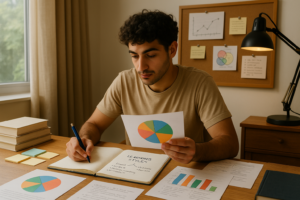Understanding Depression
Depression is more than just feeling sad or having a bad day. It’s a serious mental health condition that affects millions of people worldwide including students juggling academic and personal pressures. Understanding what depression is, what causes it and how to manage it can make a significant difference in helping yourself or supporting someone you care about.
What is Depression?
A Medical Condition Not a Weakness
Depression is a mood disorder characterised by persistent feelings of sadness, hopelessness and a loss of interest in activities you once enjoyed. It’s not simply a phase or something you can “snap out of.” Depression affects how you think, feel and behave, often interfering with daily life.
Types of Depression
- Major Depressive Disorder (MDD): Persistent symptoms lasting at least two weeks that significantly affect your ability to function.
- Persistent Depressive Disorder (Dysthymia): A chronic form of depression lasting two years or more, with less severe but ongoing symptoms.
- Seasonal Affective Disorder (SAD): Depression triggered by changes in seasons, often during winter.
- Postpartum Depression: Depression occurring after childbirth.
- Bipolar Disorder: Alternating periods of depression and mania.
What Causes Depression?
Biological Factors
Chemical imbalances in the brain, particularly involving neurotransmitters like serotonin and dopamine, can contribute to depression. Genetics also play a role – if depression runs in your family, you may be more susceptible.
Psychological Factors
Past trauma, abuse or ongoing stress can increase your risk. Negative thought patterns, low self-esteem or feelings of inadequacy can also contribute to depression.
Environmental Triggers
Life changes, such as academic pressure, financial stress or the loss of a loved one, can trigger depressive episodes. Chronic illnesses or substance abuse may also play a role.
Social Isolation
A lack of strong social connections can leave individuals feeling unsupported, which may worsen depressive symptoms.
Recognising the Symptoms
Emotional Symptoms
- Persistent sadness, emptiness or hopelessness.
- Feeling irritable, anxious or guilty.
- Losing interest in activities you once enjoyed.
Physical Symptoms
- Fatigue or low energy levels.
- Changes in appetite or weight (eating too much or too little).
- Sleep disturbances such as insomnia or oversleeping.
Cognitive Symptoms
- Difficulty concentrating, remembering details or making decisions.
- Feeling worthless or having low self-esteem.
- Recurrent thoughts of death or suicide (seek immediate help if this occurs).
How to Overcome Depression
Seek Professional Help
- Therapy: Speaking with a psychologist or counsellor can help you identify and manage the root causes of depression. Cognitive Behavioural Therapy (CBT) is particularly effective.
- Medication: Antidepressants may be prescribed by a doctor to help balance brain chemistry.
Build a Support Network
Talk to friends, family or trusted mentors about how you’re feeling. Having people who understand and support you can make a world of difference.
Adopt Healthy Habits
- Exercise: Regular physical activity releases endorphins, which naturally improve mood.
- Balanced Diet: Eating nutrient-rich foods supports brain function and overall health.
- Sleep: Prioritise 7-9 hours of quality sleep each night.
Practise Self-Care
Engage in activities you enjoy, even if they feel difficult at first. Practising mindfulness or relaxation techniques can also help reduce stress and improve mental clarity.
Set Manageable Goals
Break tasks into smaller steps to avoid feeling overwhelmed. Celebrate small victories to build confidence and a sense of accomplishment.
Limit Negative Influences
Reduce time spent on social media if it triggers negative feelings. Surround yourself with positivity and avoid environments that worsen your mood.
When to Seek Emergency Help
If you or someone you know is experiencing thoughts of self-harm or suicide, seek help immediately. Contact a trusted friend, family member or reach out to emergency services. In South Africa, you can contact:
- SADAG (South African Depression and Anxiety Group): Call 0800 567 567 or SMS 31393 for support.
- Lifeline South Africa: Call 0861 322 322.
Conclusion
Depression is a complex condition, but it’s manageable with the right support and strategies. By understanding its causes and recognising its symptoms, you can take proactive steps to address it. Remember, seeking help is not a sign of weakness – it’s a step towards reclaiming your well-being and finding hope for the future. With time, support and self-care, recovery is possible.




